Is it just me or does this time of year also make you reflective? My professional life has done a 180 degrees turn in the past 12 months – I wanted to share my story and lessons learnt.
I am a social entrepreneur…how did I get here? this time last year I was an accountant! I have been on a massive journey of self-discovery and this knowledge has transformation my life and fuel passion for rethinking the workplace. It led me to start Invisible Diversity: a social enterprise focused on neurodivergence and how we unlock the potential at work. In this article, I’ll share both my personal and professional journey in the hopes it might spark something in you too and help you on your journey to finding your purpose in life.
—a path that led me to become a social entrepreneur, driven by a personal experience that reshaped how I understand myself and the world around me.
It all began in 2019 when I faced a series of health scares. I found myself in the emergency room several times, struggling to breathe and experiencing palpitations. My oxygen levels dropped below 95%, leaving me anxious and doctors confused. At the time, the medical team could not provide a clear diagnosis, so they treated my symptoms and referred me to specialists.
I was introduced to a pulmonologist, who conducted a series of tests and although my symptoms didn’t quite meet the threshold for an asthma diagnosis, I was placed on chronic asthma medication. I took it diligently for two years, often twice a day. The medication helped, but I still experienced recurring episodes of anxiety and breathlessness. Something still didn’t add up.
Fast forward to 2020. The world changed dramatically with the onset of COVID-19. For me, the changes were compounded. My workplace transitioned to working from home rather than the open office space. We also had a new CEO, which meant a significant change in strategic priorities and responsibilities – everything became unfamiliar. I began to notice that even with the medication and breathing techniques, my symptoms persisted. My oxygen levels would still drop, and the familiar feelings of tightness in my chest would return. I started to ask myself: Is there something deeper going on here?
I then reflected on the journey of someone I know that was diagnosed with autism early on in their life. We shall call them Robin. By 2021, Robin was also struggling with extreme anxiety. Seeing Robin’s challenges made me reflect on my own experiences. I wondered, Could I be autistic, too? Perhaps the anxiety and overwhelm I felt were tied to an underlying neurodivergence.
That question marked the start of a life-changing journey. I reached out to a clinical psychologist and began a series of sessions to explore the possibility of autism. Over the course of 10–12 sessions, I gained a profound understanding of myself. His questions made me reflect on many aspects of my behaviour that had been present my entire life—interrupting people mid-conversation, struggling to manage significant changes, and feeling overwhelmed in high-pressure situations.
I realized that I had challenges with Executive Functioning—the ability to organize, plan, and manage day to day tasks (Executive Functioning (EF) refers to a set of cognitive processes that help us manage and regulate our behaviour to achieve goals.) —especially during periods of rapid change. On top of that, I became more aware of my sequential processing, sensory sensitivities: an aversion to bright lights and loud, sudden noises. I had always dismissed as either being dumb at worst or personal quirks at best. In February 2022, my diagnosis confirmed what I had suspected: I am autistic!
Coming to terms with my neurodivergence was both empowering and illuminating. I finally had a name for the struggles I had faced. This understanding empowered me to shift my focus from the challenges and embrace my strengths. It also ignited a passion to advocate for others like me, who are neurodivergent and need better support systems to thrive.
In 2022, I shared my diagnosis with my colleagues within our company’s leadership team and then more broadly with our full staff complement and then eventually on LinkedIn. I was struck by how supportive people where and how it opened a door for my neurotypical colleagues to ask questions and explore their blind spots. I was most hearted by the private conversation this stimulated with colleagues who also identify as neurodivergent and had been ‘masking’ their diversity.
I also realised how few resources and services are available for workplaces, so people are simply expected to ‘suck it up’. In our workplace we made small tweaks to meeting structure and other small accommodations. I had often wished for a right-hand partner who could act as my “external brain,” helping me stay organized and focused.
Then in 2023, with the help of my executive coach, I took the bold leap from corporate life to social entrepreneurship. I founded Invisible Diversity alongside Dr. Nick Davies, the incredible clinical psychologist I’d worked with in my initial awakening. Our mission is to advocate for neurodivergent individuals, raise awareness, and ensure access to the critical support systems they need—especially in marginalized communities. I now look ahead to building partnerships with organizations and leveraging technology—particularly artificial intelligence—to make services for neurodivergent individuals more accessible and affordable. Robin’s future, and that of countless others like them, depends on creating workplaces and societies that embrace neurodiversity as part of human diversity.
Summary
This story reflects a journey of personal discovery, resilience, and purpose.
After years of physical and mental health challenges, I was diagnosed with autism, which brought clarity to my lifelong struggles with executive functioning and sensory sensitivities and the need for a working environment that allows me to focus deeply. Inspired by my experiences, I transitioned from corporate life to social entrepreneurship, co-founding Invisible Diversity.
My mission (which I have already accepted) is to raise awareness, reduce stigma, and ensure accessible support for neurodivergent individuals—especially in underserved communities.
By leveraging technology and partnerships, I hope to create a world where neurodivergent individuals can thrive and reach their full potential.
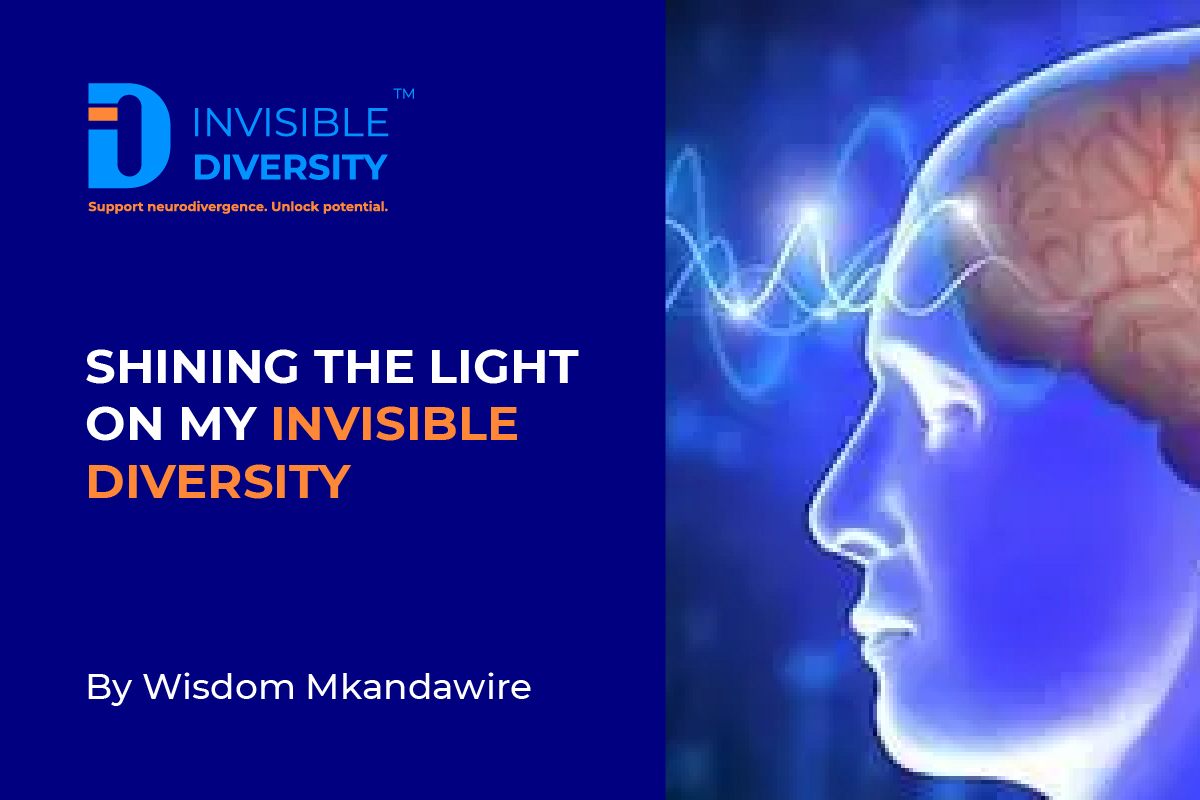
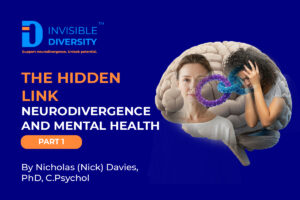
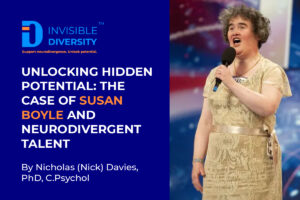
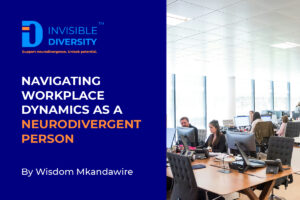
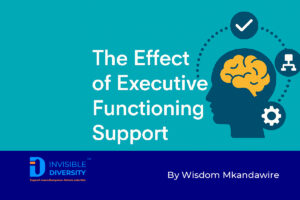
2 thoughts on “Shining the light on my invisible diversity”
Wow Wisdom, what a brilliant, insightful and inspiring piece. Thank you for sharing. My husband has been on a similar journey. Beginning to understand himself in profound new ways…and for me to learn alongside him has been life changing.
I wish you all the best on your new journey.
Please stay in touch.
Hi Linda,
I’m glad to hear that you found my story inspiring and that your husband is starting to understand himself in new profound ways.
Great that you are learning alongside your husband and tranforming your lives together.
Thank you for the wishes. I intend to stay in touch. I will reach out via email.